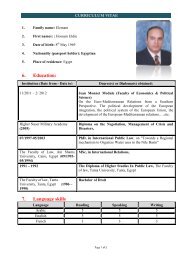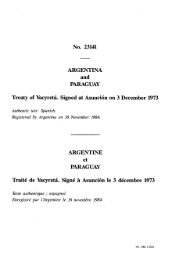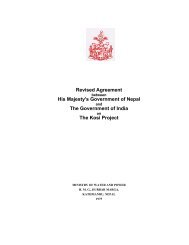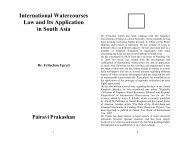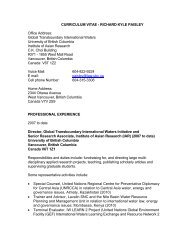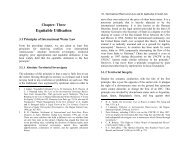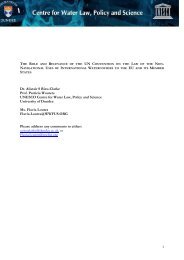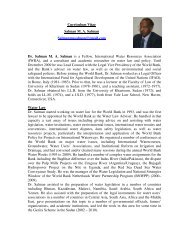Upreti, Trilochan, International Watercourses Law and Its Application ...
Upreti, Trilochan, International Watercourses Law and Its Application ...
Upreti, Trilochan, International Watercourses Law and Its Application ...
You also want an ePaper? Increase the reach of your titles
YUMPU automatically turns print PDFs into web optimized ePapers that Google loves.
84 / <strong>International</strong> <strong>Watercourses</strong> <strong>Law</strong> <strong>and</strong> <strong>Its</strong> <strong>Application</strong> in South Asia Development <strong>and</strong> Codification of <strong>International</strong> <strong>Watercourses</strong> <strong>Law</strong> / 85“1. A watercourse state is, within its territory,entitled to a reasonable <strong>and</strong> equitable share of theuses of the waters of an international watercourse.2. To the extent that the use of the waters of aninternational watercourse within the territory of onewatercourse state affects the use of the waters ofthe watercourse in the territory of anotherwatercourse State, the watercourse State concernedshall share in the use of the waters … in areasonable <strong>and</strong> equitable manner in accordancewith the articles of the present Convention …” 178However, Evensen has radically changed the 'no appreciableharm’ rule omitting the exception clause Schwebel hadadopted. Eventually, he made 'no appreciable harm' thedominant rule, a rule that was not to yield to the considerationof equity <strong>and</strong> reasonableness in the sharing of waters. Aconvincing argument, however, was not given for thischange. 179 That is to say, as the reverse of Scwebel’s st<strong>and</strong>,Evensen made the 'no-harm rule' the substantive rule of an IWC<strong>and</strong> the reasonable <strong>and</strong> equitable rule subordinate to that rule.McCaffrey replaced him as Special Rapporteur in 1985. Heinherited two sets of draft Articles that reflected a fundamentaldifference on the substance of the basic principle of IWL. Afterdiscussion, the ILC ultimately adopted Evensen's draft Articlethat had made the no harm rule the dominating concept of therules. Unlike Evensen, McCaffrey tried to give the reasonbehind the concepts of equitable utilisation <strong>and</strong> 'no appreciableharm'. His position is in line with the concept <strong>and</strong> opinion ofSchwebel with regard to the two concepts. It is obvious, in thediscussion of the ILC that some of its members supportedMcCaffrey while others were supportive of Evensen. 180178 The <strong>Law</strong> of the Non-Navigational Uses of <strong>International</strong> <strong>Watercourses</strong>.UN DOC. A/CN.4/381 (1984), also see Ibid. pp. 91-92179 Supra note 65, pp. 75-76180 Ibid. p. 77McCaffrey has held the view that (during the discussion inILC):“in the view of many specialists, the most fundamentalprinciple of international water law is that of ‘equitableutilization’. Thus, for example, a downstream state thatwas first to develop its waters resources could notforeclose later development by an upstream state bydemonstrating that the later development would cause itharm; under the doctrine of equitable utilization, thefact that the downstream state was ‘first to develop'(<strong>and</strong> thus had made prior uses that would be adverselyaffected by new upstream uses) would be merely one ofthe number of factors to be taken into consideration inarriving at an equitable allocation of the uses <strong>and</strong>benefits of the watercourse.” 181He further gives the reasons for their belief. These observersbelieve that if the 'no harm' principle took precedence over thatof equitable utilisation the effect would be to freeze thedevelopment by many riparian states of internationalwatercourses. He expounded the approach of the ILC to thisproblem with reference to an excerpt from the commentary toarticles 8:“(P)rima facie, at least (,) utilization of aninternational watercourse (system) is not equitable ifit causes other watercourses states appreciableharm…The commission recognizes; however, that insome instances the achievement of equitable <strong>and</strong>reasonable utilisation will depend upon the tolerationby one or more watercourses States of a measure ofharm. In these cases, the necessary accommodationswould be arrived at through specific agreements.” 182181 S. C. McCaffrey, "The <strong>Law</strong> of <strong>International</strong> <strong>Watercourses</strong>: someRecent Development <strong>and</strong> Unanswered Questions" (1989) in 15DJIL&P, p. 505-526.182 Ibid. p. 509, 510; also see supra note 65, p. 77.



